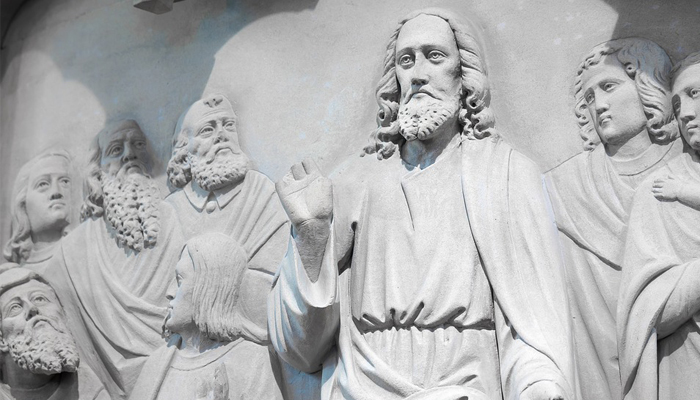
Fourteenth Sunday in Ordinary Time (Year 2/B)
A homily by Rev. Dom Pachomius, OSB:
In today’s Gospel Jesus returns to His home village of Nazareth. This is not a social visit. This homecoming of Jesus is so unlike the rock star welcome given to a local boy who wins a title at an overseas boxing event and returns home a celebrity, or a barrio lass who gets crowned as beauty queen and is paraded around town on a float, standing next to the mayor. Like other towns in Galilee, Nazareth has to hear the Good News of God’s reign.
A homecoming gone awry
When Jesus teaches in the local synagogue, many of His town mates are astonished at His rhetoric. They wonder at the origin of His teaching and the depth of His wisdom and the validity of the miracles done through Him.
With no answers to the puzzle, Jesus’ cynical neighbors move to more familiar territory to focus on what they know about Him and to look back at their memories of Him. Irrelevant issues are ceremoniously brought to the center of everyone’s attention – concerns like the job Jesus worked at, His mother, the presence of His sisters. The people of Nazareth cannot stop wondering how a carpenter can know so much about God.
It is easier having a carpenter around the shop than a prophet loose in the town. Once a carpenter, always a carpenter. In early Christian times, a formidable opponent of Christianity was a man named Celsus. He would ridicule Christians, saying, Your founder was only an ignorant carpenter in a country village. St. Mark summarizes the reaction of the Nazarene community to their fellow citizen: And they would not accept Him. The wisdom and works of Jesus were killed by familiarity.
The prophet despised
When someone from obscurity emerges to celebrated status, tongues begin to wag, or people take a second look. There is a carnival of impressions: delight is shown, congratulations are forthcoming, surprise is admitted, resentment is uncovered, polite disbelief is bared, reluctance to acknowledge local greatness is exposed. And how does Jesus react to all this? He says to them:
A prophet is only despised in his own country
Among his own relations
And in his own house.
This is a hard saying. This is an extraordinary statement from the human Jesus. Jesus is deeply affected by the way people react to Him. He is not a robot programmed for flawless performance. Distrust and indifference disable Him and render Him powerless. He decides to move out, refusing to be dragged down by His failure to reach His own. And He never returns to Nazareth again.

Expect rejection
If Jesus is rejected by His own in His lifetime, we should not be surprised if people reject us in our lifetime. No pupil is greater than his teacher; no slave is greater than his master. We should not be surprised if people reject us because we refuse to hum their tune or play their dirty little game or decline to march to war with them. We should not be surprised if people reject us because we elect the less-travelled road of dialogue and due process against those who choose the freeway of intimidation and bullying. We should not be surprised if people reject us because we speak out in defence of human rights, especially the right to life in hospitals, legislative assemblies, city halls, church pulpits, academic circles and town squares. We should not be surprised if, sometimes, our families reject us because we have failed to reach the appointed ceiling of excellence. We should not be surprised if people reject us because we continue to embrace a God who is stupid enough to keep loving and saving and creating us anew precisely because we are miserable and imperfect. We should not be surprised at being labelled a dangerous, creeping influence because we prefer to walk our talk rather than be merely timid fence-sitters or idle bystanders.
When rejection like this occurs, it is easy to lose heart. It is easy to give up. It is easy to stop loving. It is easy to grow angry. It is easy to become bitter and resentful. It is easy to hit back and retaliate. But we must resist this temptation. People will inevitably reject and spurn us, but this should not keep us from continuing to love and to reach out; nor should it arrest our readiness to forgive and to pray.

Power in frailty
By coping with discouragement and failure, with weakness and brokenness, Jesus points to the power of His Father. St. Paul testifies to this when he shares a very personal experience that we heard in our second reading today. St. Paul discovers through his own handicap that God’s grace does work through human frailty. Failure and human weakness give God immense scope to act out His own purpose. To a few, blinded by egomania and bigotry, this is an irony, a contradiction and foolishness which does not matter. Theirs is a perfect god.
Nazareth was not the end of Jesus’ career; it was the beginning of a new road. And we know from experience that when we admit our failures and limitations, that exercise in honesty can mark the beginning of a new outlook, a new understanding, a new journey. Our God who knew failure looks at ours with humor even as he smiles at us. Without a doubt, ours is a happy God! From the Mount, Jesus preaches:
Happy are you who weep now; you will laugh! Happy are you when people hate you, reject you, insult you, and say that you are evil, all because of the Son of Man! Be glad when that happens and dance for joy, because a great reward is kept for you in heaven. – Luke 6:21-23